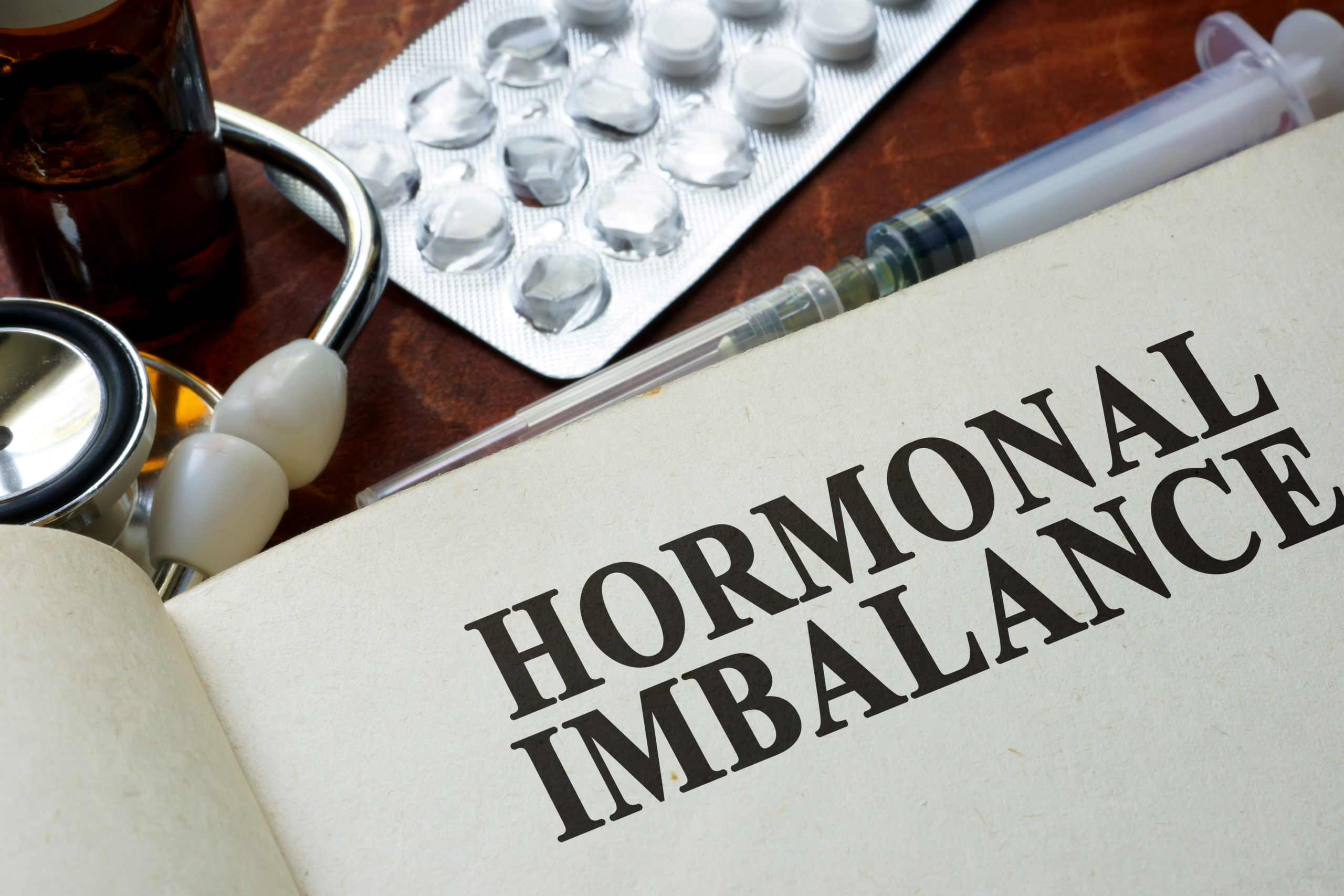Are My Hormones Causing Weight Gain?


Hormones are chemicals released into the bloodstream by glands in our endocrine systems. When there is too much or too little of a hormone, an imbalance is the result.
Hormones play a role in controlling a variety of bodily functions, including appetite, metabolism, sleep cycles, reproductive cycles, sexual function, as well as body temperature and mood. (2)
Women’s hormones in particular are an intricate, delicate, and incredibly complex symphony – a symphony that is needed to carry out conception, pregnancy, birth, and after the baby is born, milk production. This ever-shifting symphony of female hormones can easily be thrown off. (2)
One out of three women experience issues such as PMS (premenstrual syndrome), and later in life, menopause. For many, these symptoms can be crippling. (1)
Bloating, headaches, excruciating cramps, breast tenderness, and irritability are all common complaints, but perhaps one of the most annoying symptoms of having unbalanced hormones is an abnormal weight gain. (2)
Hormone Related Problems And Root Causes
A variety of hormone-related conditions that can sometimes cause unexplained weight gain in women may include:
-
- A sluggish or underactive thyroid- When the thyroid gland does not produce enough thyroid hormones to control metabolism (2)
- Polycystic Ovary Syndrome (PCOS)- A hormone-related problem that causes small cysts on the ovaries. PCOS makes it more difficult for the body to use the hormone insulin, which normally helps convert sugars and starches from food into energy. This condition — called insulin resistance — can cause insulin and sugar — glucose — to build up in the bloodstream. (10, 21)
- Menopause- Can cause hormonal changes that may make women more likely to gain weight, especially around the abdomen area. (2)
-
- Problems with the HPA (hypothalamic–pituitary–adrenal) control system – Chronic stress can be a contributor to the increased risk for obesity, especially upper body obesity, and other metabolic diseases. Elements of modern society, including the western diet, sedentary lifestyle, and environmental stress may contribute to the development of obesity and metabolic diseases. (11)
- Cushing’s Syndrome- Cushing’s syndrome is a hormonal condition. It happens when a person’s cortisol levels are too high. It can have severe and wide-ranging effects on the body including weight gain. (13)
- Hypothyroidism- Since the BMR (basal metabolic rate) in a person with hypothyroidism is decreased, an under-active thyroid is generally associated with weight gain. (14)
Ultimately to develop effective treatment or preventive interventions, a woman must first be diagnosed with one of the above medical conditions before she can address the most common reasons for weight loss resistance.
Hormones And Weight Gain
It’s important to have hormone levels checked if hormones and weight gain are a suspected problem. In other words, if you want to balance your weight, your hormones must be balanced too. Learn more about how to do that… click here.
Female hormones include:
- Estradiol – Estriol (E3) and estradiol (E2) are two different forms of the female hormone known as estrogen (sometimes referred to as oestrogen). These forms of estrogen are steroid hormones that are naturally found in the body. (6)
- Estrone – weak estrogen, and a minor female sex hormone. (7)
- Progesterone – an endogenous steroid and progestogen sex hormone involved in the menstrual cycle and pregnancy. (8)
- Testosterone – and other androgens – Combined with estrogen, the female sex hormone, testosterone helps with the growth, maintenance, and repair of a woman’s reproductive tissues, bone mass, and human behaviors. (9)
Hormonal Offenders Of Weight Gain
Some women may have higher or lower levels of testosterone and higher or lower levels of estrogen (“female” sex hormones) than others. (3)
Estrogen is one to be aware of, as both high and low levels can cause weight gain.
High estrogen levels will irritate cells in the body that produce insulin, causing insulin resistance, and sustained increased blood sugar levels, resulting in weight gain. (21,22)
Low estrogen levels can also lead to a stubborn form of weight gain. This is common during the menopausal era of a woman’s life. Since the ovarian cells no longer contain estrogen, the body searches for it elsewhere. Fat cells are one source. So, how does the body reestablish equilibrium from the low estrogen? It begins to turn all extra energy sources into fat, resulting in weight gain. (21,22)
The ovaries produce testosterone in women, but age and stress may cause testosterone levels to drop. This can lead to an increase in tension and inflammation, which can also lead to fat storage. (21,22)
The Others
Progesterone and estrogen must be in balance if the body is to function correctly. Menopause, stress, the intake of antibiotics and hormone-containing foods, and the use of the birth control pill can all cause a decrease in progesterone, along with the weight gain and depression that comes with it. (22)
Cortisol increases motivation in general (including motivation to eat). Cortisol can make us crave salty, sweet, and fried foods, which provide a rush of energy and pleasure. The more uncontrolled tension we have in our lives, the more likely we are to seek emotional relief through food. (15,16)
Another hormone, ghrelin – the so-called “hunger hormone” – activates a primal reaction from our caveman days. Hunger hormone-induced cravings gave our ancestors a survival advantage since they consumed high-calorie foods that made them more effective hunters. We don’t need the extra calories nowadays because we don’t have to forage for food anymore. (17,18)
Glucocorticoids, Melatonin, Insulin, and Leptin are also hormones that can cause weight gain in women if they are not at an optimal level. (19)
A comprehensive hormone panel (blood and saliva samples) can be useful for women at all stages of life, to learn if their hormones are balanced, or if imbalances may be causing symptoms such as weight gain. (20)
Wise Ways For Women
Lifestyle helps! Some wise ways to help cope:
- Nourishing and detoxifying the entire hormonal system. Hormone changes occur not only in the ovaries but also in the adrenal glands, thyroid, pancreas, pineal, and pituitary glands. Herbal allies can be effective glandular nourishers. Popular hormone balancers are – Black Cohosh, Ginseng, Kava, St. John’s Wort, and Valerian. (12)
- Physical activity – dancing, walking, stretching, etc.
- Taking time for solitude, for stress relief.
- Spending time with a journal, to process thoughts on feelings and their root cause.
- Drinking lots of water for flushing body systems
- Breathing techniques, to reduce stress hormones.
- Eating lean. Cutting down on sugar, meat, and white flour foods can help reduce body inflammation (5)
The dizzying dance of hormones waltzing through female bodies can wreak havoc on both emotional and physical well-being – whether young women are learning to deal with hormones, or more mature women find themselves easing into menopause.
Getting back in sync with the natural rhythms of the body, and controlling hormones and weight gain can become easier when a visit to a medical professional or a hormone specialist takes place, to find out exactly what is going on inside.
Sources:
- https://hormonehealth.co.uk/patient-resources/hormone-knowledge/premenstrual-syndrome-pms/
- https://hormonehealth.co.uk/blog/10-warning-signs-you-may-have-a-hormonal-imbalance-and-what-to-do-about-it/
- https://www.healthline.com/health/womens-health/do-women-have-testosterone#purpose-and-function
- https://www.medicalnewstoday.com/articles/321837
- https://www.peacehealth.org/healthy-you/can-you-control-your-hormones
- https://en.m.wikipedia.org/wiki/Estradiol
- https://en.m.wikipedia.org/wiki/Estrone
- https://en.m.wikipedia.org/wiki/Progesterone
- https://www.healthline.com/health/high-testosterone-in-women
- https://www.webmd.com/women/polycystic-ovary-syndrome-pcos-and-weight-gain#1
- https://www.ncbi.nlm.nih.gov/pmc/articles/PMC2858344/
- https://womeninbalance.org/choices-in-therapy/vitamins-supplements-herbs/
- https://www.medicalnewstoday.com/articles/172744
- https://www.btf-thyroid.org/thyroid-and-weight-the-science
- https://www.unm.edu/~lkravitz/Article%20folder/stresscortisol.html
- http://www.umusa.net/wellnessprograms/medicalweightloss/handouts/Emotional%20Eating.pdf
- https://www.eurekalert.org/pub_releases/2011-06/usmc-gli062211.php
- https://www.ncbi.nlm.nih.gov/pmc/articles/PMC5373497/
- https://www.ncbi.nlm.nih.gov/pmc/articles/PMC4688585/
- https://www.healthline.com/health/hormone-test-at-home
- https://www.nhs.uk/conditions/polycystic-ovary-syndrome-pcos/causes/
- https://vivifyintegrativehealth.com/blogs/10-hormones-responsible-for-weight-gain-in-women









